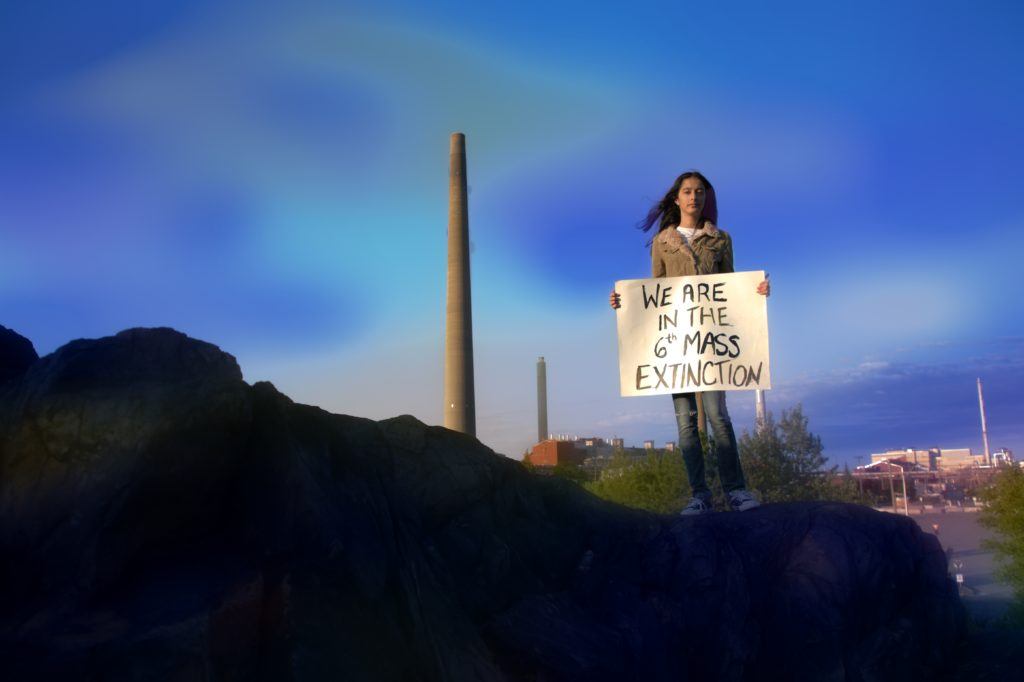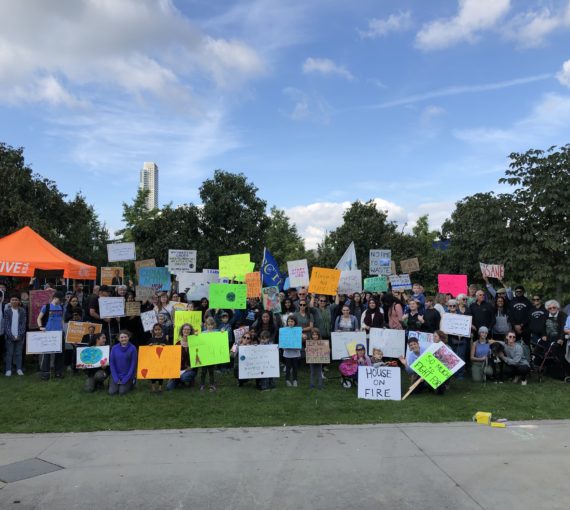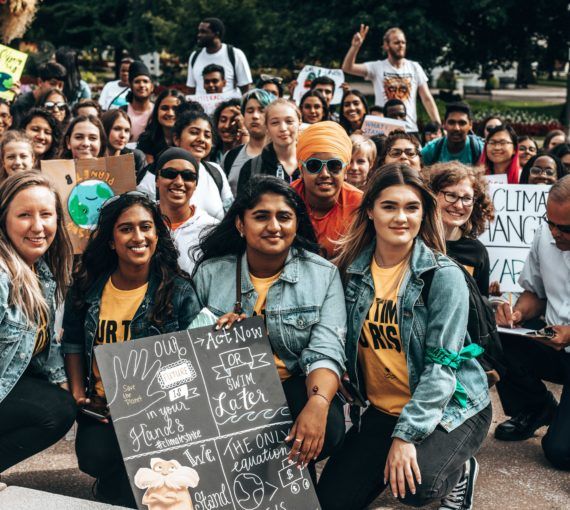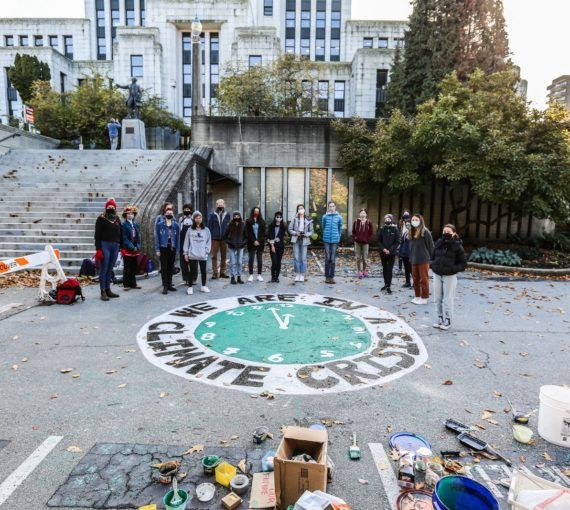
Greater Sudbury teen Sophia Mathurs stands in front of the decommissioned Vale-Inco (formerly Inco) Superstack. (Photo: Jason Leduc)
Greater Sudbury, Ontario, was once known as “the city that looked like the moon” — a town so barren it was used to train astronauts for the Apollo 16 and 17 moon missions. By the 1960s, nearly a century of mining had left behind black rocky hills, acidified soil and the smell of sulphur dioxide in the air.
Around that time, residents began to ask what could be done about their town. Thousands of volunteers worked with university scientists and the municipality to restore the soil and plant millions of trees. Forty years later, Greater Sudbury has transformed from moonscape to greenscape.
Sudbury’s regreening story shows what can happen when communities come together to find solutions for environmental problems. Today, local Sudbury youth are taking similar action to make sure their home remains a healthy place for future generations in the face of the climate emergency.
Sophia Mathur, 14, is one of those youth. Sophia became involved in climate activism at an early age. In 2018, she was inspired to bring Greta Thunberg’s school strikes to Sudbury. Thanks to Sophia, Greater Sudbury’s Fridays for Future group was the first youth chapter in Canada to join the international movement.
The job of politicians is to make our lives and our world a better place. Most politicians want to hear what’s important to their citizens. If you are concerned about the climate crisis then you should speak up and talk to your local politicians, because they work for you.
When asked why it’s important that citizens engage with their local governments, Sophia has a simple answer: “Politicians have to do the work. We have to help them. This is how democracy works.”
She continues, “The job of politicians is to make our lives and our world a better place. Most politicians want to hear what’s important to their citizens. If you are concerned about the climate crisis then you should speak up and talk to your local politicians, because they work for you.”
Politicians also need to listen to their scientists, she says, just as the city of Greater Sudbury collaborated with experts during the regreening process. That’s why Fridays for Future decided the city should create a long-term plan to meet IPCC climate targets.
The group wanted the city to start by declaring a climate emergency, but children aren’t legally allowed to petition them to make that declaration. So the group and its community allies, including many local grandparents, rallied for months to recruit signatures and letters of support from adults. Meanwhile, they continued to hold events, marches and school strikes every Friday.
The group presented its petition with over 2,000 signatures to city council in May 2019. The vote to declare a climate emergency was unanimous. Recalling Sudbury’s history of overcoming environmental crises, one councillor said, “We’ve done it already. The regreening… was an example to the world. We did that, and we can do this as well.”
Most importantly, city council agreed to back up the symbolic declaration with a Community Energy and Emissions Plan. This strategic plan was recently updated to include a commitment to achieve net-zero emissions by 2050.
Though council was supportive, it was initially more of a challenge for Fridays for Future Sudbury to bring the community on board. “It was hard to change the minds of some citizens here,” Sophia recalls. “A lot of people have lost hope. They didn’t believe that governments could do anything. But there’s still time to get our city to protect our future.”
In part, Sophia believes it was Sudbury’s history of regreening and community activism that gave residents hope that a climate declaration could lead to a better future. Sudbury’s reforestation efforts have already led to an estimated 650,000 tonnes of carbon being sequestered.
“I think people are inspired and empowered by that success story, especially older adults who’ve lived here all their life,” Sophia says.
“So when we started Fridays for Future, people realized that we’re still suffering from the climate crisis.”
Fridays for Future Sudbury’s weekly strikes and demonstrations have made them highly visible in the community, and actions have even spread to nearby Laurentian University. Sophia believes their dedicated efforts have changed mindsets over time. Many more people are beginning to take the climate crisis seriously.
I want to see different faces in the climate movement. I want to see more men, more girls of colour. I want to see more people of different races and gender identities. It’s important because climate change will affect us all.
For anyone who wants to achieve something similar, Sophia suggests starting or joining a group -— the bigger and more diverse the better to reflect the community being represented. Fridays for Future made sure to reach out to local Indo-Canadian and Indigenous groups, inviting Bollywood dancers and traditional drummers to participate in events.
“I want to see different faces in the climate movement,” Sophia says. “I want to see more men, more girls of colour. I want to see more people of different races and gender identities. It’s important because climate change will affect us all.”
Currently, Fridays for Future Sudbury is working on getting the city to sign the Fossil Fuel Non-Proliferation Treaty, a global initiative to phase out fossil fuels. The group plans to keep communicating with elected officials and to catch the attention of local media by holding publicity events. Greater Sudbury would be the third city in Canada to sign the treaty.
Sophia has summer plans of her own. She’s practising for dance recitals, hanging out with her friends in-person for the first time since the Ontario lockdown began in February and just recently graduated from Grade 8.
She admits she doesn’t want to be a climate activist forever. “I really want governments to start taking action on their own. I can tell that we’re getting there. But if we have to keep the pressure on them for a long time, then that’s what we have to do.”
This story is part of Your Voice at the Table: a Guide to Mobilizing Local Government Climate Action. Learn to work with your local government so you can build a healthy, sustainable, resilient future together.



